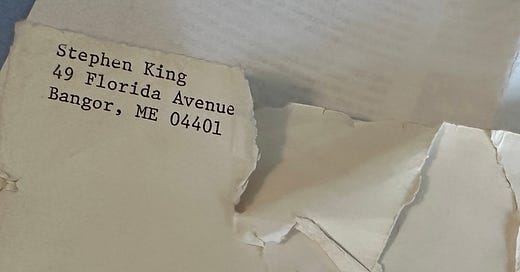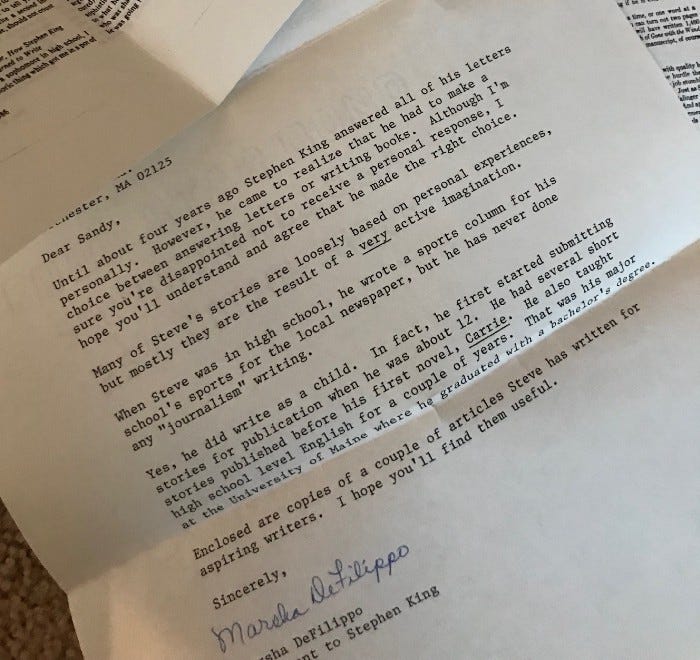While writing last week’s Monday morning greeting, I was reminded of the time I sent a letter to my favorite author, Stephen King. I was a 16-year-old aspiring novelist living in Boston and I wrote to him in the hopes that he would respond with his most valuable writing tips.
I have no idea what my letter said or how long it took to get a response. All I know is that one day in January 1992 an envelope showed up in my mailbox with the return address Stephen King, 49 Florida Avenue, Bangor, ME 04401.
I ripped that sucker open, thrilled that THE Stephen King was writing to ME to answer my many writing-related questions.
Um, no. Sadly, THE Stephen King did not write to me. His assistant, however, did. The letter politely stated that Mr. King “came to realize he had to make a choice between answering letters or writing books.” Given his continued prolific output, he obviously gave up on the letters.
She did, however, kindly take the time to answer a few of my questions. “Steve’s stories are loosely based on personal experiences, but mostly they are the result of a very active imagination. When Steve was in high school, he wrote a sports column for the local newspaper, but he has never done any ‘journalism’ writing. … He did write as a child. In fact, he first started submitting short stories for publication when he was about 12.”
Along with the letter were two articles “Steve” wrote for the now-defunct magazine The Writer: “Everything You Need to Know About Writing Successfully — in Ten Minutes,” published in July 1986, and an untitled piece from The Writer, published in June 1975 (just about three months before I was born).
A few of the tips that stand out:
“When you sit down to write, write. Don’t do anything else except go to the bathroom, and only do that if it absolutely cannot be put off.”
“Even a dead novel can provide a writer with valuable experience to take on to the next one. If nothing else, he’s not a beginner anymore when he sits down to write that second book.”
“Don’t write your novel with best-seller lists or movie companies or rich paperback houses in mind. Don’t, in fact, even write it with publication in mind. Write it for yourself.”
The last one is probably the most dated of the three. I mean, is there such a thing anymore as “rich paperback houses”?
This content contains affiliate links. I am an affiliate of Bookshop.org and I will earn a commission if you click through and make a purchase.
King goes on to share some of his favorite books:
The Postman Always Rings Twice by James M. Cain and First Blood by David Morrell, which he says are short novels that “use lots of dialogue that advances the story but seems as natural as oral speech.”
Whipple’s Castle by Thomas Williams, “a nearly perfect novel.”
Writers at Work: The Paris Review Interviews, now available online, in which “the fine writers of our time discuss their trials, tribulations, aims, and work habits.”
Though much of King’s advice can now be found in his stellar book On Writing, it’s still fun to read these decades-old articles. Though I vaguely remember being disappointed that the letter was signed by Marsha and not Stephen himself, I’m thrilled all these years later that she took the time to respond to teenage me and share a bit of insight into the King of Horror’s creative process.
Last week’s interview with Christina Perri was a fun one. I enjoyed chatting with her about her hit song “A Thousand Years” and the ways it’s evolved from a Twilight love song to a lullaby and now a children’s picture book.
This Wednesday, paid subscribers will get some extra goodies—outtakes from my fall interview with the amazing singer-songwriter-psychic medium-creative genius Jocelyn Mackenzie, along with her recommendations for really fun, unique things to watch, read, listen to, and look at. And on Friday I’ll share my interview with author Amelia Ireland, whose debut novel, The Seven O’Clock Club, is crazy good.
That’s it for now! Thanks for reading! Wishing you a wonderful, art-filled week!






